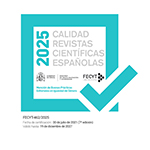La ética y estética del "Advertimiento" en la obra de Quevedo
Abstract
Quevedo's literary works display a set of variations on the anthropological and ethical dichotomy between existential awareness (“el vivir advertido”) and existential unawareness and aloofness (“la vida divertida”). As the author of hundreds of satirical and burlesque poems, Quevedo paradoxically exercised a sustained critique of the concept of “diversión”. This essay examines the different ways Quevedo gave lyrical expression to the notion of “diversion” (Pascal’s “divertissement”) in a life-long meditatio mortis. Quevedo's philosophy and poetry of moral awareness, while rooted in the leading currents of Western tradition (from Socrates, the Gospels, Seneca, Saint Augustine to Luis Vives), anticipates some of the main assumptions in the philosophy of Gracián, Pascal, Nietzsche, and Ortega y Gasset.Downloads
Article download
License
In order to support the global exchange of knowledge, the journal Dicenda. Cuadernos de Filología Hispánica is allowing unrestricted access to its content as from its publication in this electronic edition, and as such it is an open-access journal. The originals published in this journal are the property of the Complutense University of Madrid and any reproduction thereof in full or in part must cite the source. All content is distributed under a Creative Commons Attribution 4.0 use and distribution licence (CC BY 4.0). This circumstance must be expressly stated in these terms where necessary. You can view the summary and the complete legal text of the licence.









